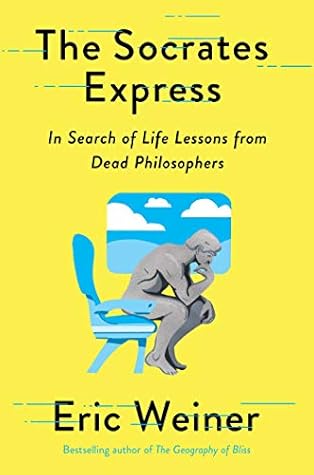More on this book
Community
Kindle Notes & Highlights
by
Eric Weiner
Started reading
January 10, 2021
ugly man, too. The ugliest man in Athens, it was said. His nose was broad and flat, his lips full and fleshy, his belly large. He was bald.
“It is a voice, and whenever it speaks it turns me away from something I am about to do, but it never encourages me to do anything.”
Crazy Wisdom operates on the premise that the path to wisdom is crooked. We must zig before we can zag.
Crazy Wisdom means casting aside social norms and risking ostracism, or worse, to jolt others
“Who created God?”
flummoxed.
stonecutter’s son who knew nothing.
wisdom of knowing what he didn’t know.
worst kind of ignorance was the kind that masquerades as knowledge.
conversation was what Socrates craved the most. “Every question is a cry to understand the world,”
Socrates was interested in “how” questions. How can I lead a happier, more meaningful life? How can I practice justice? How can I know myself? Socrates couldn’t
We know Socrates today thanks to a handful of ancient sources, most notably his student Plato.
gadfly
He cared more about method than knowledge. Knowledge doesn’t age well. Methods do.
elenchus, inductive reasoning.
“Enlightened kibitzing,”
The examined life demands distance. We must step back from ourselves to see ourselves more clearly. The
“We are considering how to live the best possible life,” he said, exasperated, to a sophist named Gorgias. “What question can be more serious than this to a person who has any sense at all?”
As much as he loved conversation, Socrates, I think, saw it as simply another tool in his kit. All this enlightened kibitzing had a goal: to know himself. By talking to others he learned how to converse with himself.
Take a word everyone knows, everyone thinks they know, and examine it, probe it, poke it from many angles. Shine a bright and unforgiving light on it.
Some twenty-four centuries have elapsed since the barefoot philosopher of Athens roamed the city’s winding, dirty streets and
indoor plumbing, almond milk,...
This highlight has been truncated due to consecutive passage length restrictions.
What is love? Why does evil exist? When we ask these questions, it is not information we desire but something larger: meaning.
Questions aren’t one-way; they move in (at least) two directions. They seek meaning, and convey it, too. Asking a friend the
Too often, though, we deploy questions as weapons, firing them at others—Who do you think you are? and at ourselves, Why can’t I...
This highlight has been truncated due to consecutive passage length restrictions.
Questions, not the eyes, are the true windows to the soul.
“All philosophy begins with wonder.”
Wondering is open-ended, expansive. Wondering is what makes us human.
curiosity.
“He sometimes stops and stands wherever he happens to be.”
“slow cure” and suggested all philosophers greet one another with “Take your time!”
“Take your time” or “Slow down.” Utter these imperatives often enough, and we might actually decelerate.
A serious question steps into uncharted waters. A serious question carries risk, like striking a match in a dark room. You don’t know what you’ll find when the room illuminates—monsters or miracles—but you strike the match anyway. That’s
Socrates was suspicious of the written word. It lies lifeless
conversation with Socrates was often infuriating and disorienting,
The goal was not to humiliate but to illuminate, to facilitate a kind of intellectual photosynthesis. Socrates as gardener.
Jacob explains that he distinguishes ordinary questioning from “deep questioning.” Ordinary questioning skates along the surface, like Siri. Deep questioning is slow and immersive.
suffer from a distribution problem, I told her.
“What does success look like?” she said.
My question boomeranged
Why do I want to be successful? I just do—doesn’t everybody? How much success is enough? More than I currently have.
as if a torpedo fish had stung my brain.
brahmodya, a competition where contestants aim to articulate absolute truth. The contest always ends in silence.
ineffable.”
This is exactly what Socrates aimed to induce: a state of ruthless self-interrogation, questioning not only what we know but who we are, in hopes of eliciting a radical shift in perspective.
The Death of Ivan Ilyich
Genuine wisdom isn’t bound by place and time. It’s portable.
Today, Greeks use metaforá to denote travel on public transport. Whenever
have come to Greece, the land of metaphors, to walk where Socrates walked, to breathe the air he breathed. I have come to remind


